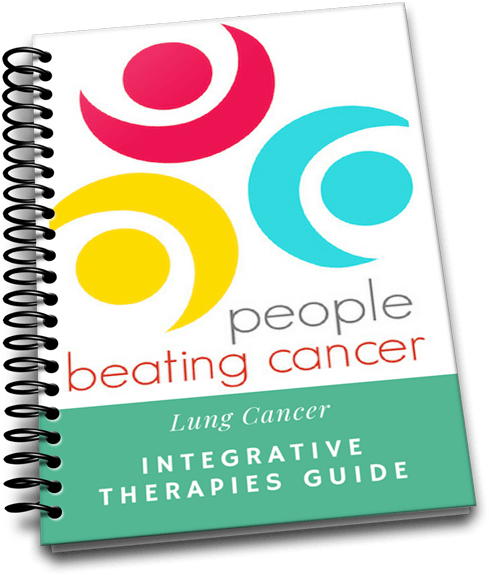Leave a Comment:
1 comment
[…] Enhance, Integrate Lung Cancer Chemo w/ Resveratrol […]
Reply
Learn about conventional, complementary, and integrative therapies.
Dealing with treatment side effects? Learn about evidence-based therapies to alleviate your symptoms.
Click the orange button to the right to learn more.

If you have been diagnosed with lung cancer, at any stage, your challenge is managing an aggressive, complicated type of cancer. Conventional therapies provide an average five year survival of 18%. I have learned that while coventional oncology is central to the cancer patient’s experience, it is limited. Consider an evidence-based, non-toxic, integrative therapy called resveratrol.
Lung cancer patients and survivors must think outside the box when it comes to their care. Managing a lung cancer diagnosis requires understanding how conventional therapies interact with side effects, nutrition, integrative/complementary therapies (such as those discussed below), and even issues such as the financial toxicity of a lung cancer diagnosis.
I supplement with a type of resveratrol that is “optimized” with quercetin. Studies linked and excerpted below cite both of these nutritional supplements as integrating with a standard lung cancer chemotherapy regimen called cisplatin.
While my cancer is much different from lung cancer, conventional oncology considers it to be a type of cancer that is incurable. I have been living with my incurable blood cancer since my diangosis in early 1994. I am confident that evidence-based but non-conventional therapies are the reason why I have lived well-beyond the published five year survival averages.
To learn more about evidence-based therapies for lung cancer, please watch the short video below:
Click here to follow along with the FREE Introduction Guide.
Click here for your FREE First Questions Guide.
Have you been diagnosed with lung cancer? What stage? What therapies are you considering? Scroll down the page, post a question or comment and I will reply to you ASAP.
Thank you,
David Emerson
“Ellagic acid (EA)—a natural polyphenol compound found in red wine—may inhibit the proliferation of lung cancer cells by inducing autophagy, according to a recent study published in the Journal of Cellular and Molecular Medicine. Further, researchers found that EA also has anti-lung cancer effects both in vitro and in vivo…
Lung cancer is a leading cause of cancer‐related mortality in developed and developing countries, which accounts for 1.59 million deaths worldwide each year.1 Current drugs (excluding surgery) for this disease include chemotherapy, radiation, targeted therapy, and immunotherapy. However, the 5‐year overall survival rate of lung cancer of all stages combined is no more than 18%.2…
Red wine component resveratrol is a small polyphenol which confers strong protection against metabolic, cardiovascular, and neurodegeneration diseases.4 Resveratrol exhibits chemopreventive5 and therapeutic effects against several cancers6 by targeting some molecules that play important roles in tumourigenesis.7 Indeed, other red wine compounds also have anti‐cancer activity.8 Ellagic acid (EA), a natural polyphenol compound found in grapes, strawberries, and nuts,9 has higher concentration in red wine than resveratrol and reaches 15 mg/L in some Spain red wine.10 Recent studies show that EA has antioxidant and preventive effects in several types of cancers.11–14 EA exhibits in vitro and in vivo anticancer activities by arresting the cell cycle, inhibiting tumour cell proliferation, inducing cell apoptosis, ameliorating inflammation, and inhibiting angiogenesis.15–18…
4 DISCUSSION
We showed that EA inhibited tumour growth in nude mice‐bearing HOP62 cells without obvious side effects, as determined by the measurements of body weight as well as serum concentrations of Cr, ALT, and AST (Figure 5). As EA monotreatment with a lower dosage only modestly inhibited tumour growth, we hypothesized that combining EA with other known anticancer agents may increase its therapeutic benefits. Among the drugs tested in a screen of human lung cancer cell lines, we found that celastrol at a very low dosage with no apparent toxicity exhibited synergistic effects with EA in inhibiting lung cancer cells and tumour growth (Figure 6). These results indicate that EA might have the potential to be developed as a therapeutic agent in lung cancer…
“These Guidelines are a work in progress that may be refined as often as new significant data becomes available. The NCCN Guidelines® are a consensus statement of its authors regarding their views of currently accepted approaches to treatment. Any clinician seeking to apply or consult any NCCN Guidelines® is expected to use independent medical judgment in the context of individual clinical circumstances to determine any patient’s care or treatment. The National Comprehensive Cancer Network makes no warranties of any kind whatsoever regarding their content, use, or application and disclaims any responsibility for their application or use in any way…”
“In the present study, we investigated the effects of resveratrol on the cell viability and apoptosis in human non-small cell lung cancer H838 and H520 cell lines. It has been found that resveratrol inhibited the proliferation of H838 and H520 cells in a dose- and time-dependent manner… Above all, resveratrol enhanced the effects of cisplatin on inhibition of cancer cell proliferation, induction of cell apoptosis…Results from the present study demonstrated that resveratrol exhibited its anticancer effects on non-small cell lung cancer H838 and H520 cell lines, and enhanced the antitumor effects of cisplatin by regulating the mitochondrial apoptotic pathway”
“In conclusion, these studies demonstrate the potential of quercetin to enhance the antitumor effect of antitumor drugs and to decrease their side effects…”
[…] Enhance, Integrate Lung Cancer Chemo w/ Resveratrol […]
Reply